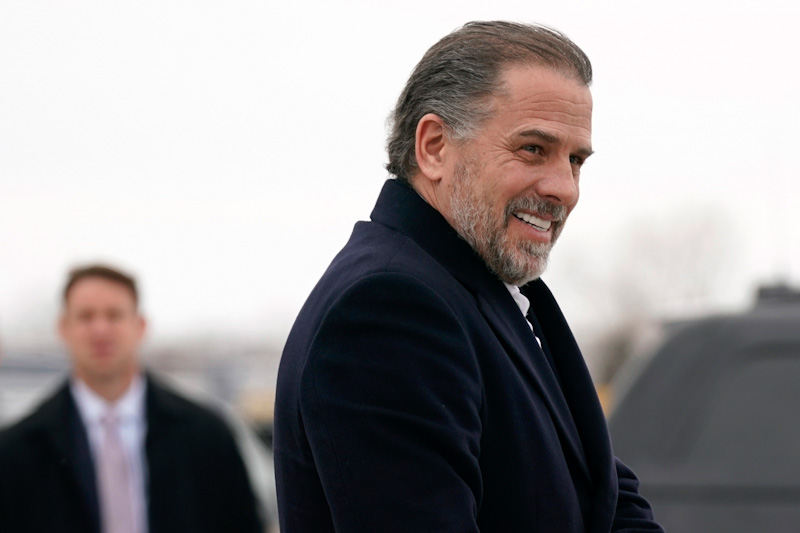Supreme Court's Bruen decision may have aided Hunter Biden in fight against gun charge

Hunter Biden, son of President Joe Biden, boards Air Force One with the president in February 2023 at the Hancock Field Air National Guard Base in Syracuse, New York. He has reached an agreement in which he will plead guilty to two misdemeanor tax charges and enter a pretrial diversion program to resolve a gun charge. Photo by Patrick Semansky/The Associated Press.
A U.S. Supreme Court decision written by Justice Clarence Thomas may have created uncertainty about the constitutionality of a gun charge against President Joe Biden's son Hunter Biden, leading to a favorable plea deal.
That’s according to Jason Willick, a columnist for the Washington Post, who points to Thomas’ opinion in New York State Rifle & Pistol Association Inc. v. Bruen. The June 2022 decision held that the Second Amendment protects a person’s right to carry a handgun for self-defense outside the home. The decision was based on historical tradition and Second Amendment text.
Hunter Biden’s plea deal called for him to plead guilty to two misdemeanor tax charges for late payment of 2017 and 2018 taxes. It also allowed him to enter a pretrial diversion program to resolve a felony charge of possession of a firearm by a drug user. The drug charge will be dropped if Biden complies with the terms of the diversion program.
The gun charge against Biden was brought under Section 922(g)(3) under Title 18 of the U.S. Code. That code provision and other criminal gun regulations are a matter of “robust debate in the lower courts right now,” according to Douglas A. Berman, a professor at the Ohio State University Moritz College of Law, who spoke with the Washington Post through email.
Berman told the Washington Post that the “prospect of constitutional challenge” likely made diversion an appealing option.
Writing for ABAJournal.com on June 29, Erwin Chemerinsky, dean of the University of California at Berkeley School of law and a Journal contributor, called the Bruen decision “the most expansive reading of the Second Amendment in American history.” Its approach, he said, is “stunning” and “will put countless laws regulating firearms in serious jeopardy.”
The 3rd U.S. Circuit Court of Appeals at Philadelphia cited the Bruen opinion when it ruled en banc June 6 that a man convicted for food stamps fraud had a Second Amendment right to possess a gun, despite a federal law to the contrary. The man could have been imprisoned for up to five years for the state misdemeanor offense—making a false statement about his lawn-mowing income to obtain food stamps in 1995.
The federal felon-in-possession law bans felons from possessing firearms. It also bans possession of guns by people convicted of state misdemeanors if they carry potential prison terms of more than two years.
Two of four dissenting judges in the 3rd Circuit had argued that majority opinion applied an analytical framework that “renders most, if not all, felon bans unconstitutional.”
Write a letter to the editor, share a story tip or update, or report an error.



